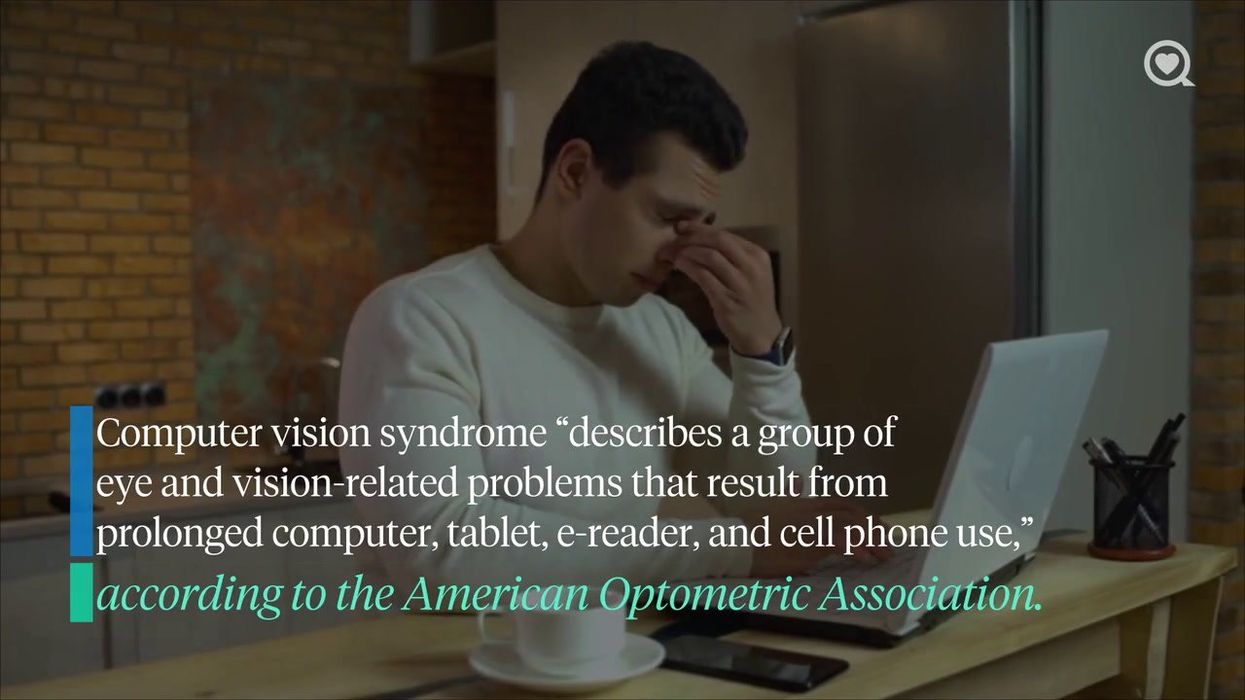Becca Monaghan
Jun 14, 2025
Do blue-light glasses help eye strain?
Sharecare / VideoElephant
If you’ve scrolled through TikTok lately, you’ll know exactly what I’m talking about – sleek, oversized, often non-prescription glasses perched ever-so-stylishly on the noses of influencers mid-haul, deep in "study with me" content, or just vibing in a mirror selfie. Blue light glasses have fast become the unofficial badge of productivity chic – giving off just the right mix of “I'm smart” and “I’m extremely online”.
But as they trend far beyond their original purpose, one question lingers behind the aesthetic: do they actually do anything?
Originally created to reduce eye strain from hours spent staring at screens, blue light blockers have enjoyed a rebrand – and not necessarily a science-backed one. Some optometrists say they might offer a kind of placebo-level comfort, while others are more sceptical, suggesting the benefits are often overstated.
To make sense of the hype, we spoke to a dispensing optician from SmartBuyGlasses, who broke down what these lenses are really all about. According to them, blue light glasses – or lenses – are made with a special coating designed to “block” or “reduce” the transmission of ultraviolet (UV) light, short-wavelength light, and blue light, depending on the manufacturer.
And let’s be honest – we’re glued to our screens. Whether it’s the 7am alarm scroll, the afternoon doomscroll, or those late-night “just one more video” spirals, digital life is relentless. Understandably, people are increasingly worried about what all this screen time might be doing to their eyes – from potential strain and disrupted sleep to long-term effects on the retina.
The optician explained that blue light lenses were originally marketed as a kind of catch-all solution: supposedly protecting the retina, easing digital eye strain, and even improving sleep. But, as they pointed out, multiple studies now show there’s little to no proven health benefit when comparing blue light glasses to regular lenses – mainly because daylight contains far more blue light than any of our screens ever could.
“Blue light glasses have a blue bloom to the surface, and when looking through the lens, it has a slight yellowish tint,” they told Indy100, noting that they can be worn at any time, depending on personal comfort.
But they’re not suitable for everyone: “These do alter the perception of colour and are not ideal for people like tattoo artists, set designers, or anyone who needs to see true colour.”
So, are they harmful or completely harmless?
“Aside from the distortion of colour, there are no negative effects from wearing blue light glasses full time,” the optician said. “But it should be noted that there is no true positive effect either. It is a personal preference.”
Even the College of Optometrists agrees. In a public statement, they said: “The best scientific evidence currently available does not support the use of blue-blocking lenses in the general population to improve visual performance, alleviate the symptoms of eye fatigue or visual discomfort, improve sleep quality or conserve macular health.”
@leilapeacock_ Blue light glasses all day 💅🏽 #bluelight #glasses #bluelightglasses #ootd
When it comes to whether this is part of a broader wellness-meets-style trend, the optician suggested it’s less about health and more about aesthetics.
“Personally I don't think the increase in blue light glasses is due to people being more health aware, but more due to the rise in social media influencing,” they said. “People are more aware of different options available to them and like to have the latest trends. I have blue light glasses, but the reason I wear them is because the yellow colour dulls the brightness of the overhead lights when I am in practice – though that could also be achieved with a light base tint rather than blue light lenses.”
In other words, blue light glasses might be less about optical science and more about optical illusion – a fashionable filter we can wear in real life.
Whether they’re a tech-savvy life hack or just another style staple, blue light glasses aren’t doing any harm – but they might not be doing all that much good either. Still, if they help you focus, look great on camera, or add a little edge to your #GRWM, who’s judging?
Sign up to our free Indy100 weekly newsletter
How to join the indy100's free WhatsApp channel
Have your say in our news democracy. Click the upvote icon at the top of the page to help raise this article through the indy100 rankings.
Top 100
The Conversation (0)














